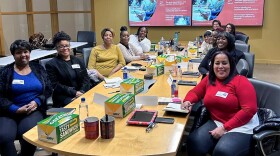Residents in the East End neighborhood of Bridgeport are working to transform a former trash dump into a hydroponic farm, but they want more federal help to help make it a reality.
The dump, formerly known as Mount Trashmore, is now called Mount Growmore. In addition to the farm, advocates hope to create a one-stop shop for social services. The farm received a $1 million grant in 2022, but a groundbreaking has yet to happen.
U.S. Senator Chris Murphy met Wednesday with residents and advocates for a listening session at the East End NRZ Market & Cafe.
Murphy is supportive of the effort; he said it’s important to have people in the neighborhood “willing to think big.” But he left the meeting wanting more details from advocates on how they would make their vision a reality.
“Here's my ask; just for you guys to spend a little bit more time telling me what the vision for Growmore is,” Murphy said. “And what you want that to be when it's fully finished?”
Advocates say there’s a big need for more fresh produce in the East End, a low-income neighborhood. It’s considered a food desert, which means residents don’t have easy access to fresh food. The area doesn’t have a supermarket.
Poverty and its knockdown effects on crime are intimately related to food, said Debbie Sims, who helped found the East End NRZ Market & Cafe in 2019. It’s one of the few places that offers fresh produce in the area.
“We know from our data, it shows us that our kids' first entry into the drug game is to put food on the table,” Sims said.
Sims said the Mount Growmore farm would ensure fresh produce and allow her store to avoid having to travel across the state to find fruits and vegetables.
Sims isn’t the only person who wants the government to step in with additional help. She mentioned other community advocates like Kenny Jackson, an outreach coordinator with RYASAP, a social services organization advocating for at-risk youth and people released from prison.
Mount Growmore wants to have a place for Jackson as well. Jackson said he wants to see the neighborhood succeed.
“My main thing is working with the youth and the families and trying to just turn the East End around, and be part of the team,” Jackson said.
Neighborhood advocates say the East End would benefit from more social services. More than 20% of residents in and around the East End were living below the poverty line as of 2022. Meanwhile, Black Rock, the city’s well-to-do neighborhood that borders Fairfield, has about a 6% poverty rate.
Sims said she’s optimistic.
“I think it was the beginning of some good discussion concerning how we are going to move the East End forward,” she said. “So we're excited.”





